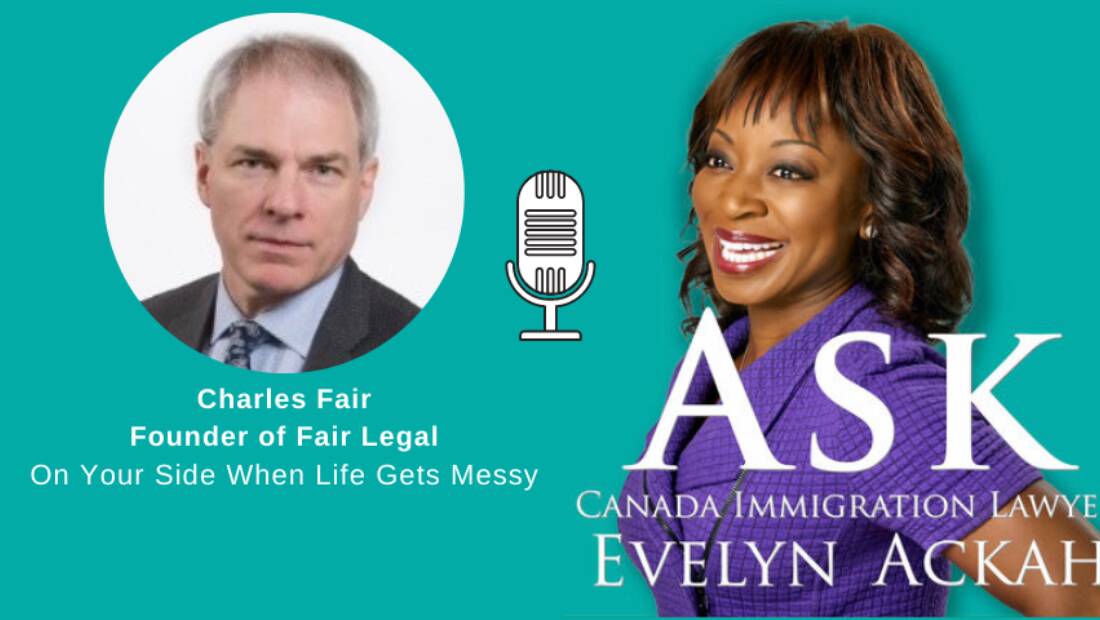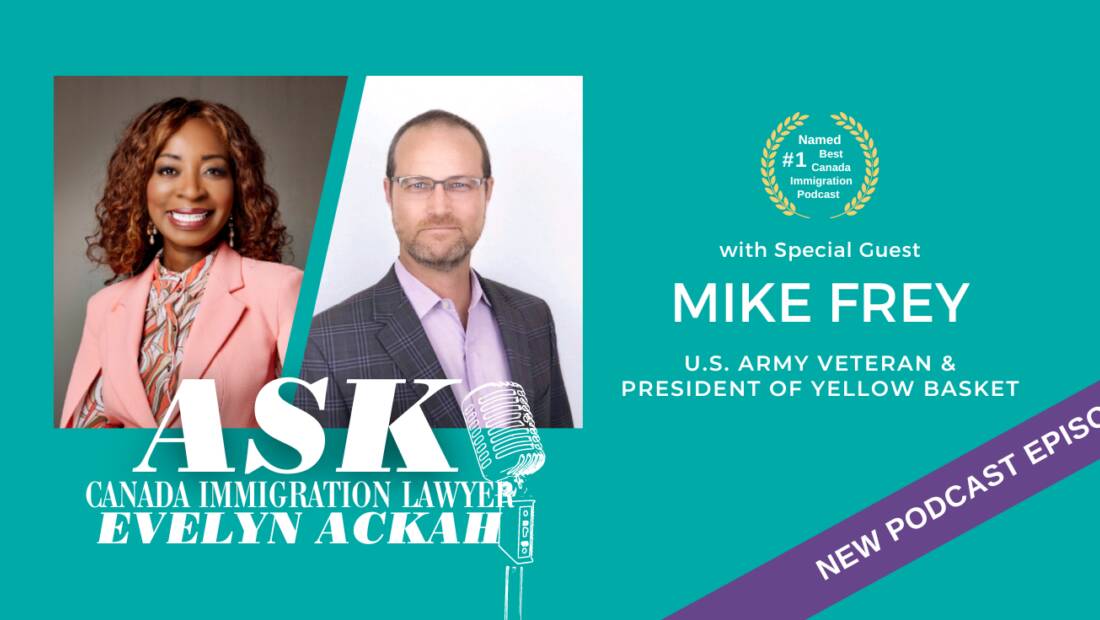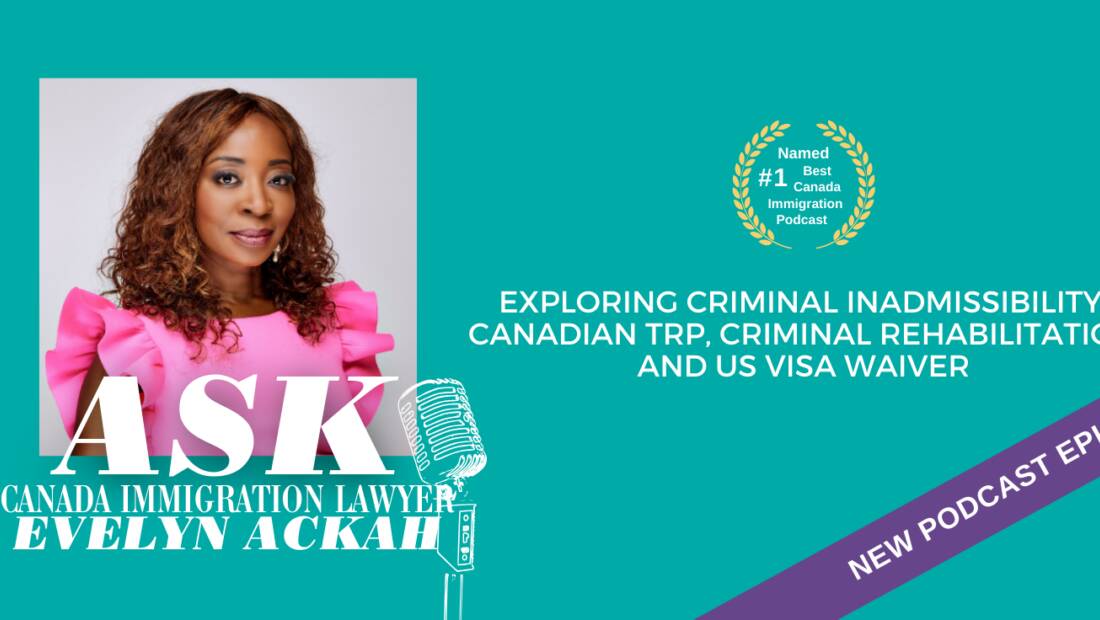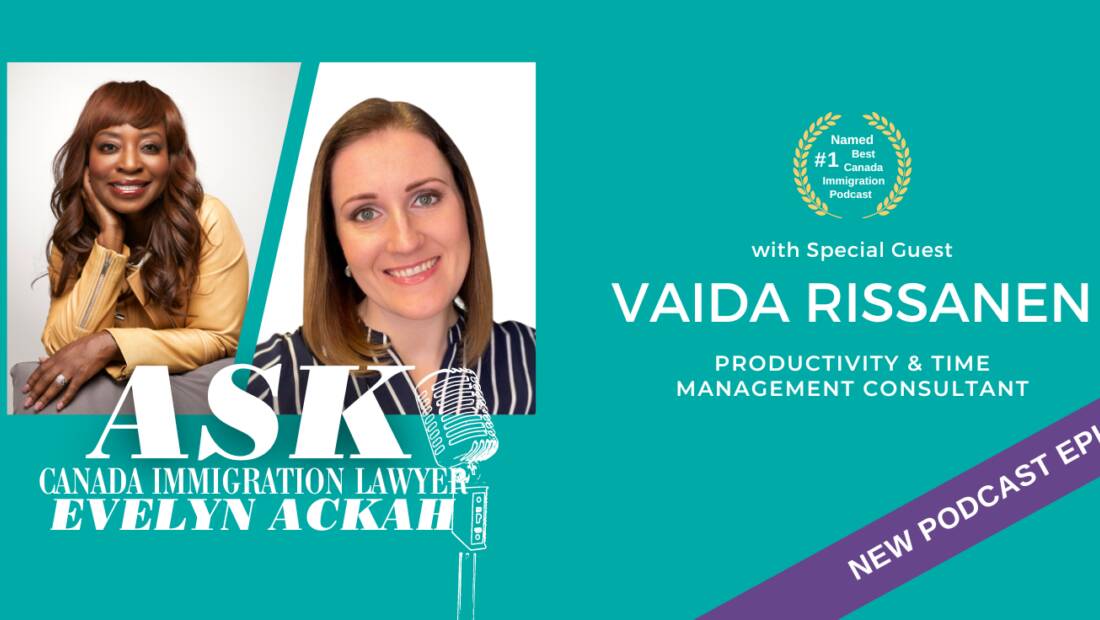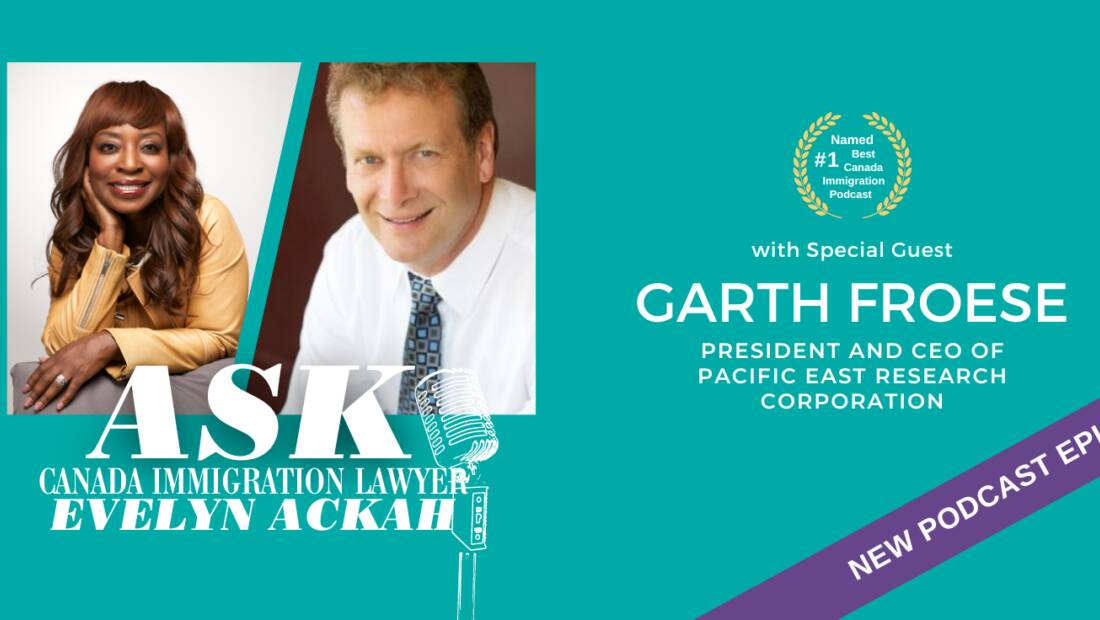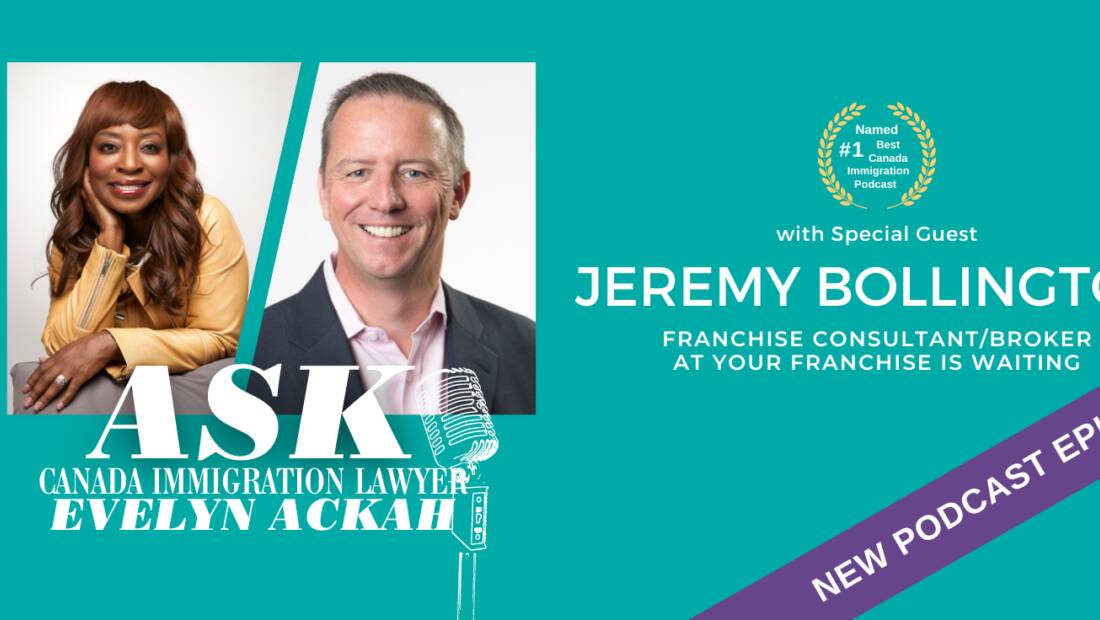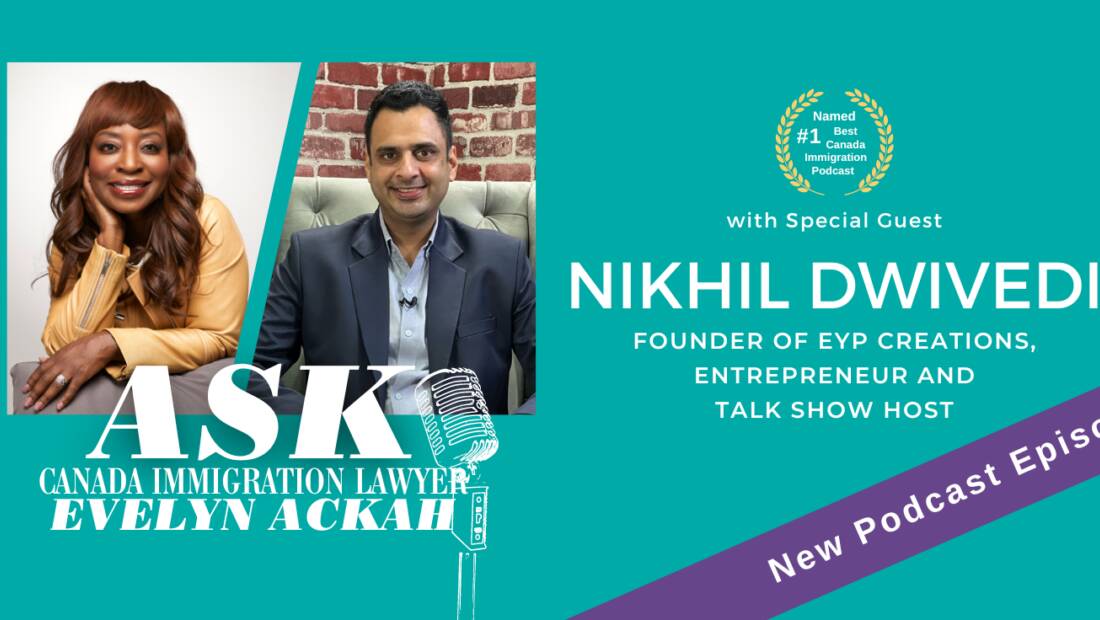Or listen on your favourite podcast app
Calgary Lawyer Charles Fair and Evelyn Ackah discuss Fair Legal in Calgary and his practice in criminal, civil and family law on the Ask Canada Immigration Lawyer Evelyn Ackah Podcast. Charles Fair has been practicing law for nearly 30 years and founded Fair Legal because he is passionate about how lawyers can help others and ensure their rights are protected and that people are treated fairly.
Charles and Evelyn discuss why he founded Fair Legal, why the choice of a lawyer is so important, and the unique legal needs of immigrants facing a family law issue, criminal charges or involvement in a legal dispute:
- How practicing law became Charles' 2nd career
- Why Charles chose to run his own law firm, versus joining a law firm
- How law school can change people's values
- His biggest business challenges running a solo law practice
- How did Fair Legal weather the pandemic?
- Hiring the right legal support team is critical for running a successful firm. Charles' hiring advice to young lawyers or to new firm founders
- Fair Legal Team 100
- Where is Fair Legal heading in the next 3-5 years?
- Having an impact on someone's life
- How a legal case in one area leads to help that client with legal cases in other areas, such as when a family law case leads to a business law case
- Immigration implications of criminal cases. Many Ackah Law immigration clients become permanent residents, but not citizens. If someone in Canada is charged with a crime, what are their rights if they are a temporary resident versus a permanent resident versus a Canadian citizen?
About Evelyn Ackah
Evelyn Ackah is the Founder and Managing Lawyer at Ackah Business Immigration Law. We work with individuals and business owners from all over the world. For more information to immigration to Canada or the United States, Ask Evelyn Ackah at Ackah Business Immigration today at (403) 452‑9515 or email us directly at contact@ackahlaw.com.

Transcript
Evelyn Ackah:
Hello. Good day. This is Evelyn Ackah from Ask Canadian Immigration Lawyer Podcast. Evelyn Ackah, it's a very long name. I have the pleasure today of having join with me is Charles Fair, who is the founder and managing lawyer of Fair Legal. Thanks for joining.
Charles Fair:
Well, thank you, Evelyn.
Evelyn Ackah:
It's great to have you.
Charles Fair:
It's great to be here.
Evelyn Ackah:
I wanted to invite you because we recently connected... we're referral partners between Ackah Law and your firm, but also we're in a business group together and we're also both in Calgary and I thought, "Well, we have to support one another." And I wanted to learn more about your practice, what you do at Fair Legal, and maybe just start off with, why did you open the firm? What was the purpose?
Charles Fair:
Well, I opened the firm... I've got about 30 years of experience as a lawyer. And most of that experience has been dealing with lots of messy litigation things. And I just found that when I've worked with other lawyers, I just don't agree with their approach to the practice of law and their approach to clients. And one of the things... sometimes it just seems to be, it's all about the money. Now, obviously, money's important for business, but that's not the only thing. The clients are really important.
Evelyn Ackah:
Mm-hmm (affirmative).
Charles Fair:
And I really think about the... so the ethics or the morality involved in a client's decision-making process, the psychological elements and when it comes to immigration, for example, when... if a criminal case has immigration implications, what might look like a straightforward deal from a standard criminal perspective, may have some very serious consequences, life consequences to the client that might not get taken into account. So I try to take into account those broader things that happen in people's lives. And that's how I got into criminal law because... Anyway, so I really like talking don't I?
Evelyn Ackah:
No, no. This is perfect.
Charles Fair:
That's why I do litigation.
Evelyn Ackah:
No, that's why you're a litigator. I always thought I would be a litigator because-
Charles Fair:
Oh, really?
Evelyn Ackah:
... I talk on and on. But it's not my personality. I like happy law. And as I say, I like the happy side of it. I'm not big on the confrontation, but I also think to be a litigator, you have to be very strategic. And so there's that part of me that I don't have that skill-set that you-
Charles Fair:
Yeah.
Evelyn Ackah:
... probably have at that level. Tell me about Fair Legal though... the practice areas specifically, so that people will know what you do.
Charles Fair:
So, our magic statement, so to speak, is that we are your champions for justice when life gets messy, whether you're facing a criminal problem, a civil problem, or a family law problem. We don't pick our... When we screw up in life, we don't pick what area of law it is.
Evelyn Ackah:
Exactly.
Charles Fair:
And so it's a very client-focused practice. And yes, I keep getting encouraged to specialize in one area or the other. And I just... I can't. And it's partly because this stuff is interactive.
Evelyn Ackah:
It is.
Charles Fair:
Somebody comes in with a civil problem, say a problem with their business,-
Evelyn Ackah:
Mm-hmm (affirmative).
Charles Fair:
... a business partnership is going bad. Well, that has family law implications.
Evelyn Ackah:
Mm-hmm (affirmative).
Charles Fair:
Or the family law has implications with the business stuff.
Evelyn Ackah:
Yes.
Charles Fair:
Maybe there's some criminal behaviour involved in that.
Evelyn Ackah:
Yeah.
Charles Fair:
There's just too many cross-cutting stuff. And people aren't thinking about those other consequences when they get a narrow focus.
Evelyn Ackah:
So, I would say litigation specifically-
Charles Fair:
Yep.
Evelyn Ackah:
... and maybe all areas of litigation-
Charles Fair:
Yeah.
Evelyn Ackah:
... that you feel confident in. So that's good to know because-
Charles Fair:
I don't do any happy law.
Evelyn Ackah:
... Well, I think you must do happy to go home when your clients get what they want and it's over and they're happy.
Charles Fair:
Well, it's always funny. It's... You finish off a file and it's not like you hope... you wish to have a repeat client. It's... both sides go, "I hope I never see you again."
Evelyn Ackah:
Exactly. I know. Even when they win, right. It is a challenge. That's the real difference between what I do, what you do. But I think you're right. One of the things you mentioned, Charles, around, let's say criminal law, is that I work with other criminal lawyers and like yourself, around the decision on immigration, the impact, settling or pleading versus fighting and trying to get completely exonerated and then having a criminal history. And if you're a permanent resident that could change your life. You could be sent to another country you may never even have ever visited or know well, because you never became a Canadian citizen. So those are real things where our practices intersect is almost like crimmigration, some lawyers call it, where there's the criminal piece and the immigration piece, and you have to work together, otherwise, the impact is so severe, right? For families as well. They've lost the breadwinner, all of those things. So-
Charles Fair:
Exactly.
Evelyn Ackah:
... Yeah.
Charles Fair:
I think of a case recently, the Humboldt bus tragedy, because it's my understanding that the person who was accused was an immigrant.
Evelyn Ackah:
Mm-hmm (affirmative).
Charles Fair:
And quite possibly, may become inadmissible afterwards.
Evelyn Ackah:
Exactly.
Charles Fair:
I'm not going to... I don't know a lot about the details, other than his sentence was way more than he ought to have gotten. And he quite possibly had a good defence, but that he was overwrought by guilt about what had happened.
Evelyn Ackah:
Mm-hmm (affirmative).
Charles Fair:
And that psychological component to the decision-making is something that I think lawyers don't always take into account. Because I think I would have... Now, I'm not saying that the lawyer who represented him didn't try. I mean, I would hope-
Evelyn Ackah:
Mm-hmm (affirmative). I'm sure. Yeah.
Charles Fair:
... that he tried. But I would think that that one way of talking to your client is saying, "Look, this is not just about you, the criminal justice system..." When I say, get off, of a criminal who's... people say that to me all the time, "Well, how can you represent somebody who's guilty?" Well, part of my job is to make sure that the state, the government, is not overreaching, right.
Evelyn Ackah:
Exactly.
Charles Fair:
Part of my passion for this is to make sure that people are treated fairly.
Evelyn Ackah:
Yeah.
Charles Fair:
Part of the role is also to make sure that the justice system, as a whole, is functioning properly.
Evelyn Ackah:
Mm-hmm (affirmative).
Charles Fair:
And if somebody is setting a really bad precedent because they're feeling guilty, they need to be thinking maybe that this is... that there's some wider issues here than just their life.
Evelyn Ackah:
Exactly. I like that. It seems like you've got this real holistic approach to the way you-
Charles Fair:
Yeah.
Evelyn Ackah:
... practice law. Yeah. I know it.
Charles Fair:
Well, Yeah. Yeah.
Evelyn Ackah:
You can't just compartmentalize. I hear what your-
Charles Fair:
Yep.
Evelyn Ackah:
... saying. That's really true.
Charles Fair:
Yep.
Evelyn Ackah:
So how did you get into law, Charles? Where are you from?
Charles Fair:
Well, it's-
Evelyn Ackah:
Give me some background.
Charles Fair:
... a really interesting question because I thought I would be terrible at it. I did an undergraduate degree in social anthropology.
Evelyn Ackah:
Yeah.
Charles Fair:
One of my courses was in legal anthropology and I thought, "Well, this is really interesting." It's fascinating because the legal system is about how we regulate our relationships between people, as a society-
Evelyn Ackah:
Yeah.
Charles Fair:
... and all of that. So I found that very interesting, but I never thought I could be a lawyer. Well, after I graduated, I worked in the IT business.
Evelyn Ackah:
Wow.
Charles Fair:
And I ended up working in the computer services group for a very large national law firm.
Evelyn Ackah:
Mm-hmm (affirmative).
Charles Fair:
And at that point, I realized, "Gosh, I can do what these guys do." So I was no longer intimidated. I mean, I come from a fairly blue collar-
Evelyn Ackah:
Yeah.
Charles Fair:
... background. My father was in computer technology himself, so I had some skillset there.
Evelyn Ackah:
Oh.
Charles Fair:
So I don't... But I don't come from... I think I was the first one of all my cousins to go into anything post-secondary so-
Evelyn Ackah:
Yeah. Yeah. I come-
Charles Fair:
... it was-
Evelyn Ackah:
... from the same background. My dad was a mechanic-
Charles Fair:
... Yeah.
Evelyn Ackah:
... So.
Charles Fair:
So I was intimidated. And then once I'm working with these lawyers trying to design databases for litigation support, I'm thinking, "I can do this." So I wrote the LSAT and I scored in the 92nd percentile. So I ended up getting into a really good law school. So-
Evelyn Ackah:
Where did you go?
Charles Fair:
... University of Toronto.
Evelyn Ackah:
Oh, great. Great.
Charles Fair:
Which was a-
Evelyn Ackah:
My sister went there too for law school. I was at UBC. Yeah, that's excellent.
Charles Fair:
It was a great school. I had such great professors and I still remember some of the words they used in their lectures. And it was a really good experience. And I remember thinking and reading some stuff about how law school can change people's values. And I recently found some articles on that issue that I had clipped at the time and stuck them in a file folder 30 years ago. And I go... I really said to myself at the time, "I'm not going to let that happen to me."
Evelyn Ackah:
Yeah.
Charles Fair:
"I'm going to come into this... I've got a set of values. I'm very interested in making the world a better place. And what is-
Evelyn Ackah:
Absolutely
Charles Fair:
... how do we make it better? Right?" And all of the philosophy and political science... when it comes right down to it, it's in the nitty gritty of the law courts where all of that stuff starts to have an effect on people's lives.
Evelyn Ackah:
Absolutely.
Charles Fair:
Right. So-
Evelyn Ackah:
Absolutely.
Charles Fair:
... you can-
Evelyn Ackah:
I think that's great. I love that. Because just like you, I'm from a background that's quite modest. We are immigrants. And it was... I was the first one, just like you.
Charles Fair:
... Yeah.
Evelyn Ackah:
Incidentally my sister's a lawyer too. So... We have to be.
Charles Fair:
Yeah.
Evelyn Ackah:
That's the immigrant obligation. You come and you have to take advantage of every opportunity. But-
Charles Fair:
Oh, for sure. Yes.
Evelyn Ackah:
... so... But you used to work in firms with other people, and then you just decided, "It's time to do my own thing." Is that what happened for you?
Charles Fair:
Oh, yeah. There was numerous irritants.
Evelyn Ackah:
Yeah. Of course.
Charles Fair:
Just a funny little thing... not funny, it's... So the firm was insisting on an administrative fee based on a percentage of my billable rate.
Evelyn Ackah:
Mm-hmm (affirmative).
Charles Fair:
And I just found that just so offensive and I couldn't get the managing partner to... I said, "Look, why don't we raise my fees?" He says, "Well, you can raise your fees if you want, but we're still raising our admin fee."
Evelyn Ackah:
That's crazy.
Charles Fair:
And I said, "Well, that means that..." This is the pay for photocopies and whatnot. So my hourly rate, much higher than a junior associates-
Evelyn Ackah:
Yeah.
Charles Fair:
... my clients are paying a higher admin fee-
Evelyn Ackah:
Mm-hmm (affirmative).
Charles Fair:
... for no extra service. It's-
Evelyn Ackah:
That was the end of it.
Charles Fair:
... and that-
Evelyn Ackah:
Yeah, no. There's always a reason I think that lawyers... I was a partner at a big firm, and there's a reason we make the change. And I think sometimes we start thinking like the client. I start... I always put myself in the client's shoes. "How does this look, if I'm the client?"
Charles Fair:
... Yeah.
Evelyn Ackah:
"How does this feel if I'm the client?"
Charles Fair:
Yeah.
Evelyn Ackah:
And if it doesn't feel right, what you did is what I did, was... I wanted to offer better and you wanted to offer better without this bureaucracy. And there's definitely some benefits of being able to make your own decision rather than going to partners' meetings to-
Charles Fair:
Yeah.
Evelyn Ackah:
... hold, what's the plan.
Charles Fair:
Yeah. And when I started hiring associates, I'm thinking, "Oh, how do I inculcate the same set of values?" Right.
Evelyn Ackah:
Yeah.
Charles Fair:
We're running a business, we've got to make sure it's profitable -
Evelyn Ackah:
Yep.
Charles Fair:
... but this is ultimately about serving our clients, serving society and making a difference in the world. And that's-
Evelyn Ackah:
Absolutely.
Charles Fair:
... So...
Evelyn Ackah:
I think that is the challenge. I mean, one thing I've noticed... I've been on my own, a small firm owner now for 10 years, just over 10 years, and the staffing or the hiring of associates... it's challenging. You may develop a wonderful array of students to become great associates, and then they get poached by the bigger firms. So it becomes a real thing of, "How is this going to work?" Because you want them to appreciate all the flexibility that they have or all the access, different from big firms, where they sit in a boardroom with paper. They don't have any client contact. They don't go to court. They don't... You know what I mean?
Charles Fair:
Yeah.
Evelyn Ackah:
They have to see, for instance, for you, the value of being... they get to go to litigation, they get to go to court, they get to... they're not the ones that do the grunt work and then someone else shows up and... Right?
Charles Fair:
Right.
Evelyn Ackah:
So it is a challenge. It is a challenge, for sure. Yeah. Can I ask you, Charles, how has COVID affected you and... or your business? Have you been busier or less busy? What's been the... your experience?
Charles Fair:
Well, initially it was interesting. There was a real boost right at the beginning because some clients, all of a sudden, were really motivated to get some cases resolved that had been sitting there and we had a wait and hold strategy because it made sense from... and then it was like, "No, let's get this done." So we had some extra work on that. I think that there's... it did affect some of our client's abilities to pay.
Evelyn Ackah:
Yeah
Charles Fair:
But, in other cases, I think the clients had more disposable income, because instead of spending it on their vacation, they were spending it on -
Evelyn Ackah:
Fighting.
Charles Fair:
... solving that mess that they had created.
Evelyn Ackah:
I heard that everybody's who's got put away so much more money than small business owners, I have no idea.
Charles Fair:
Yeah.
Evelyn Ackah:
But I've heard that. I'm glad to hear that. So if I was a client looking to contact you and reach out by email or telephone, what's your process to deciding if this is a valuable relationship that you want, or a new file that you want, so that people understand how to contact you, but also what your process is in determining if you can assist.
Charles Fair:
So, one of the things that's really made a difference in my practice is that I don't handle that onboarding, that initial intake.
Evelyn Ackah:
Mm-hmm (affirmative).
Charles Fair:
So my business manager, Melanie, is the first point of contact, or perhaps a second point of contact. So she'll actually have a consultation with the client, find out what's going on in the client's life and find out whether they can... they've got a legal problem that we can do -
Evelyn Ackah:
Yep.
Charles Fair:
... and whether they can afford us. I mean, that's often an issue and she works through all of those issues. And then she'll sign the client up and they'll pay a retainer and I get... have a strategy session with the client. And that strategy session ends up being... unless they get really long-winded, it tends to be much more efficient.
Evelyn Ackah:
Yeah, I think-
Charles Fair:
And then-
Evelyn Ackah:
... that makes... That's great. Yeah.
Charles Fair:
... I can really focus on, on solving the client's problem. Which I would anyways, but I'm not sitting there worrying about, "Oh, I'm giving away my expertise here-
Evelyn Ackah:
Yep.
Charles Fair:
... and I'm getting paid." Which is what I would generally tend to do in the past.
Evelyn Ackah:
I know.
Charles Fair:
It's been a really big thing for me so...
Evelyn Ackah:
Oh, I'm glad to hear that. Obviously I knew where that came from.
Charles Fair:
Yeah. Yeah.
Evelyn Ackah:
But I love it. I love your implementing. Do you charge for consultations or meetings with your business manager? How do people... every firm is different. Is it a free call or is it paid?
Charles Fair:
At first, a consultation with her is, is completely free.
Evelyn Ackah:
Okay.
Charles Fair:
So... And it's only if they're getting legal advice-
Evelyn Ackah:
Yeah.
Charles Fair:
... or strategy session... the strategy session is paid.
Evelyn Ackah:
Of course.
Charles Fair:
Sometimes if Melanie's not quite sure on whether we should be taking the case or whether it's something to solve, then the client gets a short, free consultation.
Evelyn Ackah:
Of course. Yeah.
Charles Fair:
Just to-
Evelyn Ackah:
Yeah. That's the challenge I find for us, is keeping ourselves focused on the existing client work, right? And not getting caught up in all the potential things that can come in the door that doesn't... that may or may not assist your client. So you want to focus on that work you have to do, that's taking care of people-
Charles Fair:
... Yeah.
Evelyn Ackah:
... and let other people manage that. So that's exactly how we do it as well. Tell me about your Team 100. I'm really impressed that you started. It looks great.
Charles Fair:
Yeah-
Evelyn Ackah:
I'm on it. So I'm honoured.
Charles Fair:
... Yeah. Yeah. The Team 100 has been a fun process because it's... I'm a member of a BNI as well.
Evelyn Ackah:
Yep.
Charles Fair:
It is a networking group. And it's a very similar idea. And that is that if I'm spending my time promoting other people's business, it just seems way more fun than promoting my own, basically. I would rather say, "Look..." It's just an easier sell-
Evelyn Ackah:
Yeah.
Charles Fair:
... to some extent. Right?
Evelyn Ackah:
Yeah.
Charles Fair:
So that's the genesis of it. And it's been really interesting. I called up somebody that we're... Okay, we had somebody to do a will client and... Sorry, they needed a will done. And I don't do any of that happy law. I don't do any such law. So I thought, "Okay, well, I'm going to go slightly outside my network-
Evelyn Ackah:
Yeah.
Charles Fair:
... to find another lawyer to refer to." So found one, contacted him, we referred him to work, he was very happy with the referral. Then we scheduled a... My staff scheduled a call with... just a get to know you call-
Evelyn Ackah:
Yeah. Yeah.
Charles Fair:
... between him and I, so I could figure out whether I'd add him to my Team 100. And as it turns out, he's also a member of BNI in another chapter.
Evelyn Ackah:
Oh, that's great.
Charles Fair:
So the very next day he sent me another client. I think he sent me another couple of clients.
Evelyn Ackah:
That's perfect.
Charles Fair:
And he got the last issue of the Team 100 that came out. A day afterwards, he sent me a client.
Evelyn Ackah:
That's awesome.
Charles Fair:
So I think that idea... it seems to be a really effective way of building relationships.
Evelyn Ackah:
Yeah. Especially during COVID. I mean, it's not like we're able to sit and have drinks and do the social stuff we use to do. I think it's a wonderful way... I'm working on it, it's been a work in progress. And seeing your great material come out, I was like, I've got to get going on this, add this to my long list of things to do. But we already, at Ackah Law, we have a referral list that's quite long. So whenever somebody needs something, my team can go through and say, "Oh, we don't do this. We don't do this cross border tax, but we have people that... accounting..." whatever they need, but I love the idea of turning it into something more formalized and that looks great and it gets to profile people. So you'll be on our list. You're already on our list, but we're going to work on our Team 100 so that we can also get ours circulating. I think it's a great way-
Charles Fair:
Yeah.
Evelyn Ackah:
... to build profile and develop.
Charles Fair:
Well... And I noticed you did an interview with another solicitor-
Evelyn Ackah:
Yes. Yeah.
Charles Fair:
... who does happy law. And I thought-
Evelyn Ackah:
Yes.
Charles Fair:
... I just told Melanie this morning, I said, "I think we should reach out to her and-
Evelyn Ackah:
She's great. Yeah. Yeah.
Charles Fair:
... develop a relationship with her."
Evelyn Ackah:
I think you should. I mean, this is what I love, is that people are finding my networks and even just doing the podcast... I did one with Daniel Davis, who is a business immigration writer, he does the business plan.
Charles Fair:
Uh-huh (affirmative).
Evelyn Ackah:
And we just got a new client out of that. And it's the opportunity to profile the people we work with, even... because when you're a small firm, you don't have the partners upstairs or downstairs to just run up and hand the work off. So you need to-
Charles Fair:
Yeah.
Evelyn Ackah:
... create that network.
Charles Fair:
Yeah. Yeah.
Evelyn Ackah:
So I think you're doing a great job with that. So tell me, where do you think Fair Legal is going to be in the next three to five years? Where do you want it to go? What do you want to do? How are you going to grow?
Charles Fair:
Well, we're working on it. We've got about 2,400 square feet in our office here.
Evelyn Ackah:
Mm-hmm (affirmative).
Charles Fair:
Which meant that in COVID we are well spaced out.
Evelyn Ackah:
Awesome. Same here. Yeah.
Charles Fair:
So I'm hoping to fill those offices. And one of the things that I'm working on is seeing whether I can integrate other non-lawyer professionals into... particularly in the psychological counselling area.
Evelyn Ackah:
Mm-hmm (affirmative).
Charles Fair:
Integrate that into the delivery of legal services, because typically that's an issue. When somebody comes in with a legal problem,-
Evelyn Ackah:
Yeah.
Charles Fair:
... they often have a bit of a psychological issue as well. I'm not saying that my clients are crazy, but... or the other side has got some psychological issues.
Evelyn Ackah:
Mm-hmm (affirmative).
Charles Fair:
And I think that we... If we just take a narrow view of the law as just being about solving the legal problem, we're limiting what the impact that we can have. So I think, more important, get a client in and they're able to see the conflict that has arisen in a different light-
Evelyn Ackah:
Yes.
Charles Fair:
... and manage their own reactions to it,-
Evelyn Ackah:
Yep.
Charles Fair:
... anger management or substance abuse.
Evelyn Ackah:
Yes.
Charles Fair:
Also-
Evelyn Ackah:
I think it's a great idea
Charles Fair:
... where they're-
Evelyn Ackah:
There's a family law firm in our business group-
Charles Fair:
... Uh-huh (affirmative).
Evelyn Ackah:
... and they provide something similar. So you need to talk to them and find out... they provide a whole other service offering that has grown their practice-
Charles Fair:
Yeah. Yeah. I think-
Evelyn Ackah:
... if you haven't already connected-
Charles Fair:
... one of my coaches had put me in touch-
Evelyn Ackah:
Good.
Charles Fair:
... with one in the States-
Evelyn Ackah:
Yep.
Charles Fair:
... and one in Mexico.
Evelyn Ackah:
Oh.
Charles Fair:
And I'm already scheduled, I think tomorrow morning, to be talking to the fellow in Mexico.
Evelyn Ackah:
Good.
Charles Fair:
I haven't yet made contact with the one in the States.
Evelyn Ackah:
I think the other one is criminal lawyer or family. It's the aftermath of all that emotionality.
Charles Fair:
Yeah.
Evelyn Ackah:
So definitely make sure... and they literally offer courses and support, and it's all the psychologists... "Here's your binder." They call it... I forget the name, but it's the Blue Binder Project where it's about all the other things that you need to take care of so you don't find yourself in this situation again.
Charles Fair:
Yeah.
Evelyn Ackah:
I think it's a great model.
Charles Fair:
I think so. So what I... I've been reaching out to other family lawyers here in the city, some senior family lawyers, and they're interested in participating in some round table on this.
Evelyn Ackah:
Good.
Charles Fair:
I've also been reaching out to psychologists who practice in the area. Some of them are... do expert reports and stuff. And there's one in particular... I'm trying to get her onto my Team 100 list because-
Evelyn Ackah:
Great.
Charles Fair:
... what she does is provide consulting, so basically litigation support-
Evelyn Ackah:
Yep.
Charles Fair:
... and will help a client... say a dad who's not really sure how to parent. He's now got a toddler.
Evelyn Ackah:
Mm-hmm (affirmative).
Charles Fair:
And then now he's got to step up to the plate and be a parent.
Evelyn Ackah:
Yeah.
Charles Fair:
And so she'll work with a client like that to help them get squared away. And I think that's better than just saying... taking a cold standoff, "Well, we're solving the problem as it is. And the facts are what they are." No, the facts are always in constant change.
Evelyn Ackah:
Yeah.
Charles Fair:
We might as well have a positive influence on the facts as well as on the law. So...
Evelyn Ackah:
Oh, I love that. I love that.
Charles Fair:
Yeah.
Evelyn Ackah:
I think this is something you need to really think about developing or branding around the fact that you're focused on... Charles, making the world a better place. And it's not just, "I fought this fight in court and we won." It's, "How do I impact my clients' lives for the rest of their lives?"
Charles Fair:
So that's a-
Evelyn Ackah:
I love that.
Charles Fair:
... Well, and that's where I have a problem with, how do I market it? So I'll give you an example of-
Evelyn Ackah:
Yeah.
Charles Fair:
... a criminal client.
Evelyn Ackah:
Yeah.
Charles Fair:
Actually it was criminal and family.
Evelyn Ackah:
Okay.
Charles Fair:
This guy is a blue-collar guy. He'd go out hunting, then he'd go to the bar and get drinking, then he'd get into a fight, the police would be called... the same escalation.
Evelyn Ackah:
Yeah.
Charles Fair:
I think he was facing 16 charges or something. I had him... I was on for him, I think, four different courts. Red Deer, Calgary, one way up north... Yeah, I just... I got an agent to deal with that one-
Evelyn Ackah:
Wow.
Charles Fair:
... down in Turner Valley. And a lot of this was anger management.
Evelyn Ackah:
Mm-hmm (affirmative).
Charles Fair:
And then you start probing into it and you realize, "My God, he grew up in a family where his stepdad was very physically abusive, he had alcohol issues." And by demonstrating to him that I really was on his side... out of those 16 charges, the Crown ended up with withdrawing, almost all of them. I think he only had to do some intermittent sentence on one in Red Deer, which was a road rage incident. The assaulting the police officers and all of that stuff-
Evelyn Ackah:
That's great.
Charles Fair:
... down in Turner Valley was all gone-
Evelyn Ackah:
That's great.
Charles Fair:
... as a result of my work. And one day he calls me up. He says, "I got a problem with my exes..." because he had a couple of kids, right?
Evelyn Ackah:
Yep.
Charles Fair:
"The exes cut me off because I'm seeing the kids and her new boyfriend is driving me crazy. And if somebody... something doesn't change, we're going to have another problem." And so at this point, I'm now counselling him on-
Evelyn Ackah:
Yes.
Charles Fair:
... how to communicate with... he can't communicate with his ex because she's cut him off all communications. Right? So now he's got to go through the boyfriend. So now we're looking at a very dangerous, volatile, three ways situation.
Evelyn Ackah:
Mm-hmm (affirmative).
Charles Fair:
And he was listening to me. He was listening to me because he knew... because he trusted me because-
Evelyn Ackah:
Of course.
Charles Fair:
... I was on his side. Right.
Evelyn Ackah:
Exactly.
Charles Fair:
And I say, "Look, this is how you do it. This is how you stay focused." And he called me back a few days later, he said... or a few weeks later or whatever, he said, "I was successful in getting through to the boyfriend." He opened up a channel of communication so that he could talk to the ex about parenting.
Evelyn Ackah:
Yeah.
Charles Fair:
She restored his parenting time and she dropped her child support application, which meant that I lost my child... my family law file, but-
Evelyn Ackah:
Yeah.
Charles Fair:
... you know what?
Evelyn Ackah:
But that's-
Charles Fair:
It was an impact. And I go... Well, that's when you have an impact on somebody's life.
Evelyn Ackah:
Yeah.
Charles Fair:
That's where... So...
Evelyn Ackah:
That's the difference.
Evelyn Ackah:
Oh, I love it. I love it. Well-
Charles Fair:
My problem is, how do we say to them, "Well, come to Fair Legal if you've got anger management issues and you need somebody that you can trust." I mean, it's... I don't know how to pitch-
Evelyn Ackah:
No, but I think... I'm sure you'll come up with it. With our business group, I think you'll be able to... for me, it's very much, you take care of all aspects of people's lives-
Charles Fair:
Yeah. Yeah.
Evelyn Ackah:
... not just the litigation, but I think it's-
Charles Fair:
Well, yeah.
Evelyn Ackah:
... looking at it in this full circle picture of-
Charles Fair:
Yeah.
Evelyn Ackah:
... "How can we help you leave this relationship or this engagement with us better than you started and not just because you got off or whatever, but also how can we develop you so that you won't have to keep getting into the cycle." Right? "How can we break those cycles." So I think it's a great model.
Charles Fair:
Yeah.
Evelyn Ackah:
I definitely do. I think that you're onto something and I'm looking forward to hearing more about it.
Charles Fair:
Yeah.
Evelyn Ackah:
Is there anything else Charles, you want to share with us about you or Fair Legal before we wrap up our podcast today and that... but let people know where to find you and how to work with you. Is there anything else you want to share? Because I think you've given us a really good sense of who you are, what you want and your philosophy and your why. Why you do what you do.
Charles Fair:
Yeah.
Evelyn Ackah:
You've given us that. And I love that.
Charles Fair:
Yeah. Yeah. Well, if one of your clients wants to reach out to me, that's great. They can contact your office and ask for the referral. I'm happy to do that. Right. So...
Evelyn Ackah:
Or they can find you online at Fair Legal.
Charles Fair:
Or they can... Yeah, fairlegal.ca. Yeah. Yeah.
Evelyn Ackah:
Great.
Charles Fair:
Yeah. So-
Evelyn Ackah:
Great.
Charles Fair:
... But... Yeah, no, I don't think I have anything else to add. You get me talking and I'll then talk for a few hours.
Evelyn Ackah:
I'm looking forward to when we can meet in person and sit on a patio and-
Charles Fair:
Yeah.
Evelyn Ackah:
... have a glass of wine.
Charles Fair:
That was the funny thing is it's true because we have such wide spaces... we have COVID screens and all of that-
Evelyn Ackah:
Yeah. Same.
Charles Fair:
... and masking and everything... and we'd give clients an option and they'd say, "Oh, we can come into the office? Oh, please let me come into the office."
Evelyn Ackah:
I think everybody's just anxious to be able to-
Charles Fair:
Yeah.
Evelyn Ackah:
... engage with each other. So I really look forward to meeting you in person and Melanie as well and seeing your firm grow and develop. And I really appreciate your-
Charles Fair:
Yeah.
Evelyn Ackah:
... time today, Charles. Thank you so-
Charles Fair:
Yeah.
Evelyn Ackah:
... much-
Charles Fair:
Yeah, good.
Evelyn Ackah:
... for being on our podcast for Ackah Law.
Charles Fair:
It's been really fun. Okay. Thank you.
Evelyn Ackah:
Thank you.

